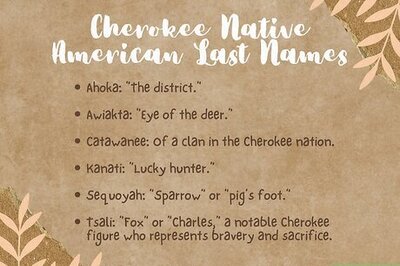
views
As he walks down his six hectares of land in south Punjab's Jhaloor village, Balvinder Singh recalls those dark days and nights of 2016. A mob of Jatt Sikhs raided the village in Sangrur district and chopped off his mother's legs, even as she pleaded with them to kill her rather than maim her. Balvinder tells us how the local gurudwara had blared out instructions not to let any Dalit enter or leave the village. He also suspects collusion between the police and Jatt Sikhs.
The atrocity has not doused the fight in Balvinder. “Sar phutega, khoon bahega, hum us qurbani ke liye tayyar hain (Heads will roll, blood will flow, We are ready for any kind of sacrifice)," he says, glowering.
Punjab's Malwa region has seen many caste conflicts over the last four years, mostly centered around the 51,000 acres of land reserved for Dalits. Jhaloor has been the epicenter of peasant movements in Punjab. Last October, protests broke out there as Dalits protested fielding of a dummy Valmiki candidate by a rich farmer to buy panchayat lands.
It's alright till the time the Dalits are mere tillers of the land, but when they demand their rights they are tortured. This is what we hear across Punjab.
At 32 percent, Dalits they may be a significant number but they own just 3 percent of land in the state. This election season, farmers of Jhaloor find themselves stranded as no political party have come to empathise with them. Balbir Singh, sporting a saffron orange turban, expresses his despair: "So much happened but no political party came to express their sympathies, fake or for real.”
He says, “AAP makes big promises, they talk of morals but they didn’t say a word to us. It works in the interest of politicians that Jatts and Dalits fight among themselves so that Sikhs vote for Akalis and we go to AAP. Dalit ki party BSP ne bhi kuch nahin kiya (BSP which is the party of Dalits has done nothing).”
In Jalandhar’s leather belt, Steven Klair runs a multi-million dollar tannery business. His brother is an Akali Dal MLA but Klair feels that the Dalits of Punjab need a party exclusively for themselves. "We get lollipops from political parties and they utilize our votes. When you are in some other party which is a mixture of everybody then those people prevail upon you." Klair says.
The Bahujan Samaj Party is fielding candidates in all 117 seats and its president Mayawati will soon arrive in Punjab to campaign. The BSP has failed to win even a single seat in the last three assembly elections. While it managed to poll on an average 5 percent votes in all assembly elections since 2002 but couldn't convert it into a single seat in Punjab assembly. "After Kanshi Ram passed away there is a huge leadership vacuum, there is nobody they can trust. There is nobody. There are leaders in BSP but their high command is in UP. There is a gap between Punjab and UP." Klair says.
In order to tap into this restlessness and leadership vacuum among Dalits, AAP, the new entrant in the bipolar polity of Punjab has promised a Dalit Deputy Chief Minister if voted to power. But many like Klair are sceptical. "Why not a CM? We have a population of 32 percent and in Doaba 45 percent. Why not a Chamar CM? Jatt Sikhs are less, Hindus are less. In democracy, who has the numbers represents the entire community." he says.
There has been a sharp decline in political representation from when Kanshi Ram was alive. In 1992, the BSP had nine MLAs in the Punjab assembly. BSP was seen as the party of Dalits but today Dalits are struggling on all fronts. Separated at birth among 39 Scheduled castes, Dalits are a fractured demographic and not really a force to reckon with. The 10,000 deras in Punjab often decide their votes and hence their fate.

Kanshi Ram’s sister Swarn Kaur
Sant Baba Phool Nath Dera in Kapurthala next to the Grand Trunk road is one of 15 such of the Ravidassiya community in the district.
Krishan Nath questions the manner in which Deras function. Divide and rule is the principle they follow, according to him. "1947 mein desh azaad hua, hum Azaad desh ke ghulam log hain. Dere wale logon ki madad nahin kar sakte. Kehte hain chai piyo, pani aur langar khao aur ghar ko jao, mandir ki ghanti bajao, koi school ki ghanti ki taraf nahin le jata (In 1947 the country became independent, we are slaves of an independent country. Deras can’t help people)," he says.
Those like Gini Mahi, a pop sensation whose hit number Danger Chamar busted a few charts, talk about a utopian state. She deconstructs a place called Begumpura (a land where there will be no sadness). While talking to us in a recording studio in Jalandhar, 18-year-old Mahi calls herself an Ambedkarite.
Her chartbuster number titled Chamar Pop has over 4 lakh YouTube views and its sequel was shot in February last year. This 18-year-old is a favorite at religious congregations of Ravidassiyas. Mahi explains, “The word Chamar to us – Ch se chamri, ma se maas and ra se rakt- in teeno se insaan bante hain.” Hoping to be a playback singer one day in Bollywood, Mahi feels her caste identity doesn’t really bind her.
Such is the celebration of identity and assertion among the Dalits in the Doaba region of Punjab that lyrics on Chamar identity are becoming a part of the popular culture. Failed singers like 47-year-old Lagoo who had tried his luck in all genres of music from Sufi to pop are now singing Chamar pop. Lagoo says that his song Sikka Chal da Chamara da has already become a rage on YouTube.
If Mahi is the face of the new age Dalit assertion, Bant Singh symbolizes the fearless and hurt Dalit. In Mensa, Bant sings songs of fear every father carries in his heart. Guns not gold for dowry so that the daughters of Dalits can shoot their harassers. Bant’s minor daughter was raped by 3 Jatt Sikhs in 2002. He took his daughters rapists to court, and they hit back in 2006 by chopping off his arms and legs. Bant says,""The upper caste rapists offered me land and money to settle the case. But I thought that if I, a Dalit leader, struck a deal with my daughter’s rapists then what kind of message would I be sending? They would continue to rape our daughters and pay us for it."

(Bant Singh)
Bant, now a star campaigner of AAP, says, “Akalis oppressed them and now AAP is speaking their language.”
Arvind Kejriwal’s party is trying to fill the leadership vaccum in Kanshi Ram’s home state where the BSP couldn’t really take off. Call it political symbolism, Kejriwal also visited Kanshi Ram’s home cum memorial in Ropar district to mark his 82nd birth anniversary. Kanshi Ram’s sister Swarn Kaur blames BSP supremo Mayawati for failing to fill in the big shoes of the Dalit icon.

(Kanshi Ram’s sister Swarn Kaur with CNN-News18's Marya Shakil)
“Janta nahin bhoolo, leader bhool gaye, paise ke laalach vich Mayawati bhool gayi, log pachta rahe hain ke aisa heera rehbar kahan hai,” Swarn Kaur says. Her nephew further blames Mayawati for making BSP a UP-centric party in her bid to remain the legatee of Kanshi Ram. While the family may disagree with behenji’s style of politics there is agreement on one front - that she got the statues of Kanshi Ram erected to ensure that he is remembered.


















Comments
0 comment